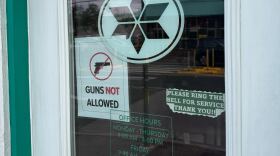-
Duke Law School Second Amendment scholar Hayley Lawrence spoke with HPR’s Maddie Bender about the Supreme Court case Wolford v. Lopez, and the implications for Hawaiʻi.
-
The U.S. Supreme Court hears oral arguments today in a case challenging a 2023 Hawaiʻi law that bans firearms by default on private property; The state Legislature convenes a new session tomorrow
-
The Supreme Court seems likely to strike down Hawaiʻi's restrictions on carrying guns in stores in the justices’ latest firearm case since their landmark decision expanding Second Amendment rights.
-
Hundreds attended the Tuesday morning rally in response to a lawsuit filed challenging the private school’s longstanding policy to give preference to Native Hawaiians when considering potential students.
-
There are many legal challenges to President Donald Trump's executive orders from funding cuts to diversity, equity and inclusion programs to the abrupt firings by the Department of Government Efficiency led by Elon Musk. The Conversation talked to Avi Soifer, former dean of the University of Hawaiʻi William S. Richardson School of Law.
-
The U.S. Supreme Court has decided not to step in on a pair of major climate cases brought by the City and County of Honolulu against several oil companies.
-
The Supreme Court has rejected a challenge to Hawaiʻi’s gun-licensing law, though three justices expressed a willingness to hear arguments over the issue later. The majority did not explain their reasoning in a brief order on Monday declining to take the case.
-
Second Amendment activists in Hawaiʻi are celebrating a recent legal change that allows them to carry not just guns but other weapons — from battle-axes to butterfly knives — openly in public.
-
Last month, the state Department of Transportation agreed to roll out a new plan to reduce carbon emissions after facing a lawsuit from a group of young plaintiffs. HPR's Savannah Harriman-Pote spoke with young people from across the country about the highs and lows of their legal battles.
-
A recent U.S. Supreme Court ruling established that presidents have immunity from being prosecuted for exercising their “core” constitutional powers. Former University of Hawaiʻi at Mānoa William S. Richardson School of Law Dean Aviam "Avi" Soifer talked about the what the decision means.
Play Live Radio
Next Up:
0:00
0:00
Available On Air Stations









